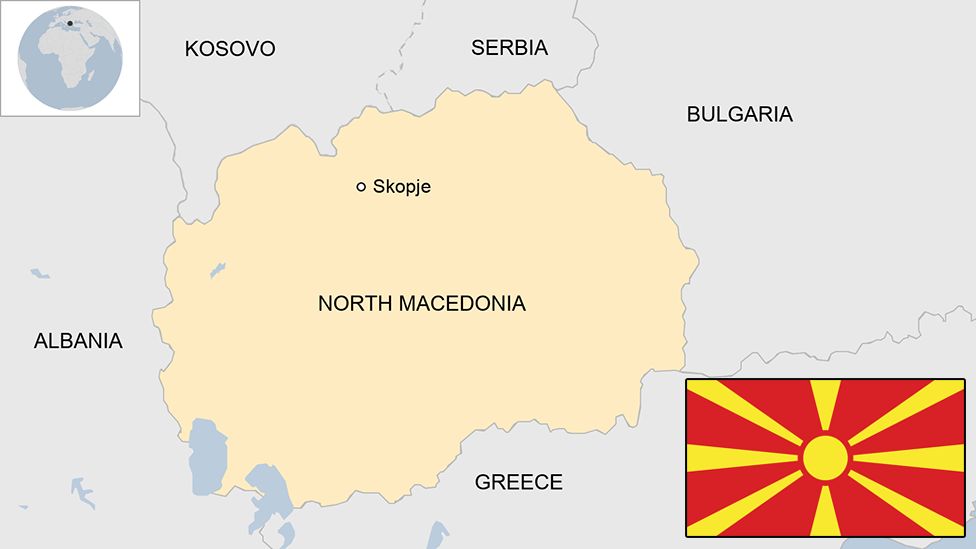North Macedonia country profile
- Published

North Macedonia was spared the inter-ethnic violence that raged elsewhere in the Balkans following the break-up of Yugoslavia in the early 1990s, but came close to civil war a decade after independence.
Rebels staged an uprising in early 2001, demanding greater rights for the ethnic-Albanian minority.
After months of skirmishes, EU and Nato support enabled the authorities to strike a peace deal. Albanian fighters laid down their arms in return for greater minority representation.
International recognition of the country's split from Yugoslavia in 1991 was held up over Greek fears that its name implied territorial ambitions toward the northern Greek region of Macedonia. In 2018 the then Republic of Macedonia and Greece agreed on a new name - the Republic of North Macedonia - which came into force in February 2019.
- Read more country profiles - Profiles by BBC Monitoring
REPUBLIC OF NORTH MACEDONIA: FACTS
- Capital: Skopje
- Area: 25,713 sq km
- Population: 1.8 million
- Languages: Macedonian, Albanian, plus Turkish, Romani, Serbian, Bosnian, Aromanian
- Life expectancy: 73 years (men) 77 years (women)
LEADERS
President: Stevo Pendarovski
Stevo Pendarovski won the 2019 presidential election as a candidate of the Social Democratic Union of Macedonia and the Democratic Union for Integration. He won 51.6% of the votes cast in the second round of the election.
Pendarovski defeated the nationalist candidate Gordana Siljanovska-Davkova.
North Macedonia's presidents are directly elected for a five-year term. The president appoints the prime minister, and legislative power is vested in parliament.
Prime minister: Dimitar Kovacevski
After the 2020 parliamentary elections in North Macedonia, Kovacevski was appointed Deputy Minister of Finance in Zoran Zaev's second government
Zaev announced his resignation as both prime minister and party leader after a defeat in the 2021 local elections. Kovacevski won internal party elections in December 2021 and was sworn in as prime minster in January 2022.
The country's main political divergence is between the largely ethnically-based political parties representing the country's ethnic Macedonian majority and Albanian minority.
MEDIA
Television is North Macedonia's most popular news medium. Public networks face stiff competition from commercial stations, which dominate the ratings.
TIMELINE
Some key dates in North Macedonia's history:
1913 - Ottoman rule in Europe ends after five centuries. Historic Macedonia is partitioned between Serbia, Bulgaria and Greece. What is now North Macedonia is incorporated into Serbia.
1914 - World War One. Macedonia is occupied by Bulgaria.
1918-19 - Macedonia becomes part of Serbia again. The Kingdom of Serbs, Croats and Slovenes is founded, and is renamed Yugoslavia in 1929.
1945 - Establishment of Yugoslav socialist federation, comprising six republics, including Macedonia.
1980s - Rise of nationalism among federation's constituent republics.
1991 - Declaration of independence. International recognition is slow because Greece objects to the use of the name Macedonia, the same as one of its own provinces.
1991 - Majority of voters support independence in referendum. International recognition slowed by Greek objections to the name Macedonia, which the same as its neighbouring province.
1993 - Gains UN membership under the name Former Yugoslav Republic of Macedonia.
1995 - Greece recognises independence, lifts earlier trade restrictions.
2001 - Uprising by ethnic Albanians. Rebel militia engages in skirmishes which bring country to brink of civil war. Peace deal involves greater recognition of Albanian rights in exchange for rebel pledge to lay down arms.
2005 - Macedonia becomes a candidate for EU membership.
2018 - Referendum to change country's name to North Macedonia declared invalid due to low turnout. Government presses ahead, in line with an agreement with Greece.
2019 - Name change to North Macedonia comes into force after ratification by Greek and Macedonian parliaments, opening way for Greece to stop blocking its neighbour's bid to join EU and Nato. North Macedonia signs Nato accession agreement.
Related Topics
- Published28 June 2023
- Published22 May 2023
- Published28 June 2023
- Published8 January
- Published10 July 2023
- Published28 June 2023